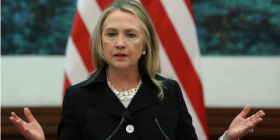She won the election by leaning right on national security and left on the economy. Now comes the fallout
AMERICA’S first woman president won last November by taking two large risks, transforming an election campaign that had seemed to be slipping away from her. One of those gambles, her hard-edged response to the Cuban-refugee crisis and post-Castro turmoil on that island, may yet pay off for her. The second, her populist “Contract with the Middle Class”, has hit early turbulence, bogging down the rest of her domestic programme.
One hundred days into Hillary Clinton’s presidency, pundits have been quick to note the irony. A politician long called overly cautious has spent her first months in office dealing with the fallout from acts of campaign-trail boldness. The 45th president this week tried to laugh off reports that her husband, Bill Clinton, told a private gathering of Silicon Valley bosses that “all this stuff is costing Hillary her honeymoon as president.” The First Gentleman says that he was misquoted. Mrs Clinton began a White House lunch with women senators by joking: “This president came here to work, not have a honeymoon.” But Mr Clinton is right. Most presidents arrive in office able to set the agenda, at least for a while. This president is being buffeted by events.
Start with Cuba, epicentre of the crisis that so destabilised the presidential campaign of Mrs Clinton’s Republican rival, Marco Rubio. It has been months since TV screens were filled each night with scenes of American coastguard and naval ships pulling desperate balseros (rafters) from the sea. A recent Gallup poll showed that 74% of Americans now support Mrs Clinton’s policy of suspending all applications for asylum by Cubans, at least while talks continue on organising free elections on the island. Since taking office Mrs Clinton has not wavered from the line that she adopted as a candidate last October, as the Castro era came to a chaotic and unexpectedly rapid end. As she said in a presidential debate with Mr Rubio: “There are 11m Cubans. They deserve a free and prosperous homeland, not empty promises that they can all move to America.”
To this day Mr Rubio’s admirers accuse Mrs Clinton of using a “racist” strategy to drive a wedge between Cuban-Americans and other Hispanic voters. They are especially angry with Vice-President Tim Kaine, a former governor and senator from Virginia who learned Spanish as a missionary in Central America, for his declaration on the campaign trail that “Cubans deserve our sympathy, but they are not our only neighbours”—a line that Republicans called blatant pandering to Mexican-Americans.
Now, with the election a distant memory, Republicans in Congress remain divided over the other half of Mrs Clinton’s outreach to Latinos: her promise to send a comprehensive immigration bill to Congress during her first year in office.
Something’s gotta give
With the Senate divided 50-50, giving Democrats a tiny edge when Mr Kaine casts a deciding vote as vice-president, and the House still firmly controlled by Republicans, Mrs Clinton will need bipartisan support (indeed a miracle, some would say) to get any bill passed. Optimists argue that Republicans simply cannot ignore America’s growing diversity. Mrs Clinton not only held Mr Rubio—the first Latino presidential candidate—to 35% of the Hispanic vote, she narrowly defeated him in Florida, his home state. In his dignified concession speech Mr Rubio reminded his party that almost a million American teenagers of Hispanic origin reach voting age every year, giving Latinos and other immigrants a voice that “cannot be ignored”.
Optimists also point to Mrs Clinton’s pragmatic streak. She has wooed moderate Republicans by ditching her election promise to seek full citizenship for undocumented migrants now in the country. Legal status is already a huge advance for those living in the shadows, Mrs Clinton says.
Pessimists argue that Mrs Clinton’s relations with Congress are souring faster than expected. She campaigned as a Washington insider who is “not too grand to go to Capitol Hill and cut deals”, in a none-too-subtle rebuke of her predecessor, Barack Obama. Her first weeks saw some successes, among them the easy Senate confirmation of the treasury secretary, Jason Furman, and the defence secretary, Michèle Flournoy. She scored a further coup with the surprise appointment of a Republican as her secretary of state. Mrs Clinton nominated Senator Bob Corker of Tennessee, who as chairman of the Senate Foreign Relations Committee earned a reputation as a thoughtful dealmaker.
During confirmation hearings Mr Corker came under fire from some in his own party, notably Senator Ted Cruz of Texas, who quoted comments Mr Corker had made questioning Mr Obama’s dealmaking with Iran. Mr Cruz suggested to Mr Corker that he is a “decoy duck”, recruited to lead fellow-Republicans to ignore their qualms about the nuclear pact. Still, Mr Corker was eventually confirmed 68-28.
But it did not take long for Mrs Clinton and Congress to find reasons for mutual suspicion. Audible mockery greeted the arrival in the Senate of a new, appointed member to represent Virginia, to fill the vacancy left by Mr Kaine’s election as vice-president. The interim appointment was in the hands of Virginia’s governor, Terry McAuliffe, who duly chose himself. Senator McAuliffe will need to seek direct election at the next general election in 2018 if he decides to remain in Congress. Until then even some Democratic senators have questioned their new colleague’s past as a chief fundraiser for Bill Clinton. “Don’t enough Americans think we are all bought and paid for?” asks a centrist Democrat.
Such ill-will will do little to help the Contract with the Middle Class. Mrs Clinton delighted Democrats by backing a rise in the federal minimum wage to $15 an hour and calling for working mothers to enjoy two months’ paid leave after giving birth or adopting a child. Amid Republican cries that she would lead America down a “European” path to bankruptcy, few voters examined the contract’s fine print.
The scrutiny has started now. Walmart, America’s largest private employer, said in March that it might have to automate many checkout lines in its stores if the federal minimum wage was raised to $15, well above the $10 that the store currently offers its lowest-paid staff. A report by the non-partisan Congressional Budget Office (CBO) gave warning that in the short term a higher federal minimum wage might cost as many as 2m jobs. The White House pointed to the report’s predictions of more benign long-term effects, as higher salaries led to more consumer spending. But the CBO report could be ready-made for makers of TV attack ads.
The president’s plans for paid maternal leave are also in doubt. Asked to explain the origins of her pledge, a former campaign strategist for Mrs Clinton calls it “nuts” that America, unusually among rich countries, does not offer a nationwide right to maternity leave. “Also, we were losing the election,” adds the strategist, noting that almost as soon as the plan was unveiled, Mrs Clinton’s vote share grew sharply among married women voters.
It’s complicated
The Contract with the Middle Class calls for the costs of maternity leave to be met by a new quasi-insurance fund, with contributions from employees (capped for the low-paid) and employers (with special breaks for small businesses) as well as tax credits from the federal government. Even some Democrats privately deride the scheme as absurdly complicated.
The rest of Mrs Clinton’s domestic programme is pretty cautious, even dull. An early ambition is to reform the tax code, modestly, with new revenues going to early-childhood education. There is talk of an infrastructure bank to fund new roads, bridges and smarter electrical grids.
Even Washington’s over-caffeinated pundits are not about to write Mrs Clinton’s political obituary, just months into her presidency. But in an age of gridlock there is a price to be paid for making bold promises on the campaign trail. The first 100 days of an American presidency are not what they once were.
Correction. The original version of this article included a reference to the “Senate confirmation” of Jake Sullivan as national-security adviser. In fact, that role does not require Senate confirmation.






Leave a reply